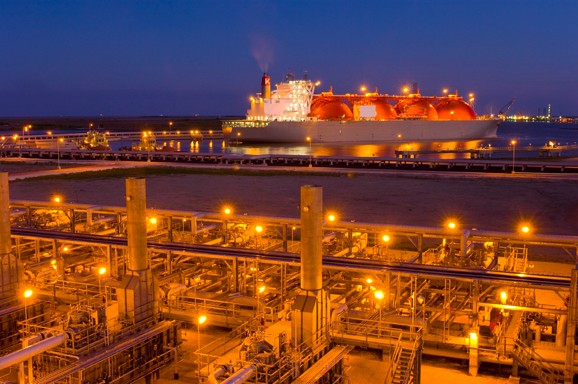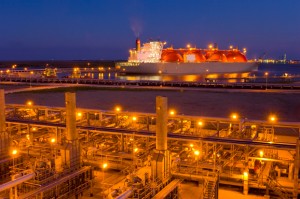Ever since the U.S. Department of Energy (DOE) authorized a second project to export liquefied natural gas (LNG) to countries with whom the United States does not share a free trade area agreement (non-FTA countries) a great deal of discussion has ensued about how many authorizations will follow, the pace of decision-making for each authorization, and whether the established order for project approval/consideration is the right way to proceed.
At the core of this discussion lies the concern that certain projects with strong commercial prospects may be delayed beyond the window of economic opportunity by virtue of their place on the export approval list and the pace of approvals. The issue is very important for private sector interests and worthy of discussion.
However, an issue of longer-term consequence is whether these two authorizations taken together constitute an export policy? With so much focus on process it’s easy to lose sight of whether or not U.S. policy governing LNG exports is clearly defined.
The first approval underscored DOE officials’ apprehension regarding potential “public interest” impacts of LNG exports. The Sabine Pass approval included a clause making clear that the United States could revoke the right to export if/when it negatively impacted public interest. Concern over this so-called “revocation clause” (a source of much consternation among the private sector), along with increasing interest in export opportunities sparked a period of delay and study which occupied much of 2012 (see previous CSIS Commentary on export approval and study process).
On May 17, the DOE conditionally approved Freeport LNG’s application to export LNG to non-FTA countries for their FLEX project at Quintana Island, Texas—the second approval of its kind after Cheniere’s Sabine Pass project was approved in May of 2011. DOE’s order allows Freeport to export on its own behalf, or as agent for others, up to 511 billion cubic feet per year (1.4 Bcf/d) of domestically produced natural gas for 20 years starting 7 years from the date of issuance or upon completion of the facility. The authorization is conditional upon the completion of FERC’s environmental review process. The Freeport authorization made clear that the prevailing economic analysis conducted in 2012 indicates that LNG exports generally create overall macroeconomic benefits to the U.S. economy as a whole, but that DOE would periodically review the “cumulative” impacts of export projects throughout the approval process to ensure the economic impacts of each approved project are as expected. Meanwhile, Secretary of Energy Ernie Moniz has committed to Senator Wyden to review the comment process and underlying analysis and determine whether or not the DOE process is progressing as it should.
The consensus view is that DOE, by approving a second project after such a long period of study, has shown itself not opposed to LNG exports and that the path forward is merely an issue of timing and order (not inconsequential issues). What does this imply about U.S. policy toward LNG exports?
Absent further insight it appears that the administration is trying to operationalize the “sweet spot” concept—the idea that there is a level of exports (generally thought to be in the 6-8 billion cubic feet per day range) to be achieved that will provide benefits to domestic producers and international consumers without harming the U.S. economy. The tacit recognition that some level of export is against the public interest leads one to believe that DOE will seek to maintain control over export levels at least in terms of how fast capacity comes online. It also can be argued that the perceived desire to assert some control over export volumes means that things like conditional approvals, cumulative impact studies, and “revocation clauses” appear much more like avenues for interpreting structural regulatory uncertainty in the market than they otherwise would be in a more clearly articulated policy environment.
A third authorization or set of authorizations (overdue by some estimates derived from testimony given by Assistant Secretary for Fossil Energy Chris Smith suggesting a two month time horizon for future approvals) could signal a significant shift in the current “slow-go” approach. For instance, if the administration approved a number of projects at once (over and above the 6-8 bcf/d export level) and conducted pro forma cumulative impact studies it would indicate a much more free-trade oriented export policy. Comparatively, the approval of projects on a case by case basis every two months would signal a more managed approach. Thus, while authorization #2 did little to clarify DOE’s intended policy approach, a third approval may provide greater insight as to whether or not the current process and pace will continue or if adjustments will be made.
In reality, the administration has two fundamental challenges with regard to LNG export approvals.
The first is to sort through a backlog of export approvals in a sensible way that protects the public interest, gives clear direction to private companies, and avoids lawsuits from other countries or companies. The second is to establish a clear policy and process governing LNG exports that makes sense in today’s context and going forward. Thinking about the issue in these two buckets may provide some additional flexibility for the administration as it considers what constitutes near-term solutions versus longer-term policy guidance.
Over time, policymakers will either become more convinced of the economic benefits of exports, the ability of the U.S. natural gas supply-base to respond to increased demand, and the sustainability of the price differentiation among regional gas markets and subsequently approve export projects on a routine and reliable basis, or they won’t. Whether or not natural gas exports will, over time, be viewed through a more conventional trade policy lens is still very much unknown. For now, it is clear that some voices in the administration and Congress are arguing that that LNG exports are in the public interest but the current process and pace of approvals also suggests there is a healthy amount of skepticism about whether or not the analysis to date will play out in reality. Based on the two export authorizations thus far, a concrete policy seems yet to be determined.
Sarah O. Ladislaw is co-director of the Energy and National Security Program and senior fellow at the Center for Strategic and International Studies in Washington, D.C. William Hicks, CSIS Energy Program intern, provided research assistance.
Commentary is produced by the Center for Strategic and International Studies (CSIS), a private, tax-exempt institution focusing on international public policy issues. Its research is nonpartisan and nonproprietary. CSIS does not take specific policy positions. Accordingly, all views, positions, and conclusions expressed in this publication should be understood to be solely those of the author(s).
© 2013 by the Center for Strategic and International Studies. All rights reserved. Republished with permission

 Join The Club
Join The Club












